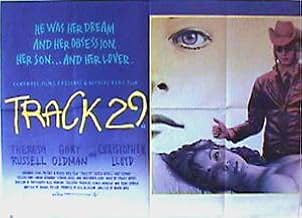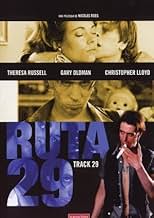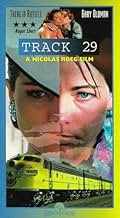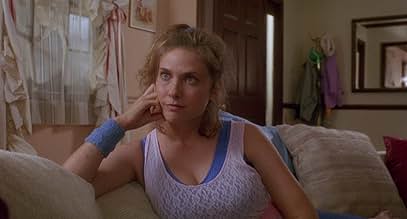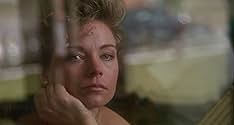NOTE IMDb
5,8/10
2,7 k
MA NOTE
Ajouter une intrigue dans votre langueLinda is still tormented by giving up a baby for adoption at 15. She wants a baby, but her husband has enough in his model trains, mistress and being a doctor.Linda is still tormented by giving up a baby for adoption at 15. She wants a baby, but her husband has enough in his model trains, mistress and being a doctor.Linda is still tormented by giving up a baby for adoption at 15. She wants a baby, but her husband has enough in his model trains, mistress and being a doctor.
- Réalisation
- Scénario
- Casting principal
- Récompenses
- 1 victoire et 2 nominations au total
Vance Colvig Jr.
- Mr. Ennis
- (as Vance Colvig)
Elijah Perry
- Redneck
- (as Jerry Rushing)
Toni De Rose
- Young Linda's friend
- (non crédité)
Avis à la une
The plot is wacky enough to promise a great film: a repressed alcoholic middle-class housewife with incestuous tendencies, married to a doctor with infantilism tendencies, encounters a young English guy who turns out to be her lost son (fruit of a teenage rape, whom she had to give for adoption). But it's not clear what's real & what's not. Freud would be proud.
The bad thing is seeing how generic Hollywood-ian Nicolas Roeg's direction has become. There really is very little here that reminds of "Don't Look Now" or "Bad Timing". Not that it's not worth watching. The spanking sequence is hilariously disturbing, the film has the feel of a hysterically surreal 80's soap opera, and the interplay between past, present, reality & fantasy is sometimes inspired.
In fact David Lynch ended up copying lots of stuff from here, particularly on "Twin Peaks" and "Lost Highway". Notice for example the demonic rape scene, or the merging of the truck driver and lost son characters.
The bad thing is seeing how generic Hollywood-ian Nicolas Roeg's direction has become. There really is very little here that reminds of "Don't Look Now" or "Bad Timing". Not that it's not worth watching. The spanking sequence is hilariously disturbing, the film has the feel of a hysterically surreal 80's soap opera, and the interplay between past, present, reality & fantasy is sometimes inspired.
In fact David Lynch ended up copying lots of stuff from here, particularly on "Twin Peaks" and "Lost Highway". Notice for example the demonic rape scene, or the merging of the truck driver and lost son characters.
Hard as it is to imagine a film starring Christopher Lloyd, along with Gary Oldman and the incredible Theresa Russell as long-lost mother and son reunited in the most unmateral way, to be unwatchable, but this one was. Her accent was so atrocious I could not get past that, fascinating as her relationship with her son--whether dream, fantasy or reality I could not figure out and soon lost any interest in deciphering--may have been.
What comes out is a jumbled, middled mess. You really can look away from a trainwreck.
What comes out is a jumbled, middled mess. You really can look away from a trainwreck.
Nicholas Roeg's "Track 29", while confusing and frustrating, appears to accomplish what the director and writer set out to do. The film introduces and examines many aspects of Linda's life that are never very clearly answered. If Martin is a figment of her imagination, what is truly imagined? He does appear at the hamburger stand, so is he real after all? Early in the film, a television program is overheard discussing the idea that "two things may ocupy the same time and space". If this is indeed true, than maybe one thing can ocupy more than one time and space. It appears that Linda and Martin may in fact be "exploring" alternate dimensions. The film seems to explore the occurrence and outcome of many different events, and ends with the viewer unclear about what truly happened and what did not. After undergoing real or imaginary emotional torture, Linda calmly collects herself and leaves the house a new woman. To further confuse the lines between imaginary/real, her husband is heard calling to her, even though a pool of blood is forming over her head. (presumably from the stabbing death of the same husband) It is through these very strange events and ideas that the director and writer force the viewer to attempt to decide what is real and what is imagined. The most frustrating thing of all is that there is no real answer to this question.
In a small southern American town, housewife Linda Henry lives a unsatisfied life and wants a child to fulfil that gap, but her husband Henry seems more concerned about his model trains and receiving his fetish spanking from nurse Stein. One day in a diner, an odd and mysterious young English lad Martin approaches Linda and her friend. He seems to appear where she is, so when another confrontation eventuates. He admits to being her son, which he was taken from her at birth when she was a teenager, due to the reasoning of his conception. This newfound responsibility is bittersweet for Linda, but has it come at a price for her well-being.
Bizarre, extremely bizarre and sultry! Nicholas Roeg's "Track 29" is really hard to fathom, which can make it quite frustrating, due to the fact the pieces of this hysterically traumatic psychological puzzle never come to be one. Maybe that was on purpose, as the dysfunctional characters (usually lurking in small town settings) we follow seem rather disconnected, never quite sure of themselves and longing for something which could lead to an emotional breakdown. This exploration into the protagonists' wavering consciousness brings out many facets, like revelations of the past and those things that matter most for them to feel anything. The obsessive nature takes hold, where torment and frustration develops with neurotic results, which could finally lose out to fantasy, because reality and their situation is just to hard to come to grips with. Because of that, Dennis Potter's unbalanced, warped screenplay really does put you on the spot and throws around plenty of eye-boggling surreal passages. Symbolic clues feature thickly throughout and the themes that drown the moody, but complex script leave a strong imprint. While I don't think it's all-successful in conveying its ideas, it's still very interesting to watch.
Building it up is the unusual kinky charge, perversely pitch-black humour and a terror-away performance by the nutty Gary Oldman. Boy, Oldman annoys with his infantile portrayal, but that peculiar intensity he generates and his edgy rapport with co-star Theresa Russell has you hypnotised. The two have some curious exchanges. Russell projects a fully realised performance, that bubbles, but you also feel her growing pain and uncertainty of her fragile character. Too bad about the southern accent though. Christopher Lloyd goes offbeat too, but more so in an understated and controlled turn. Sandra Bernhard's Nurse Stein makes an impression. Roeg's leisurely paced direction might not be as beautifully visceral, but winning out is a very gleeful and excessive approach that's high quality. Like Oldman's character, Roeg lets it play out like a kooky tantrum with a lingering mean-streak. The leering camera-work seems to hover on its shots awkwardly, or give it a smothering feeling, and the simmering music score is been kept under-wraps.
Another original and provocative piece of work into the realm of surrealistic ambiguity combined with expressive allegories and a sensually twisted flavour. This one really challenges the viewer (like most of Roeg's work), then highly entertains.
Bizarre, extremely bizarre and sultry! Nicholas Roeg's "Track 29" is really hard to fathom, which can make it quite frustrating, due to the fact the pieces of this hysterically traumatic psychological puzzle never come to be one. Maybe that was on purpose, as the dysfunctional characters (usually lurking in small town settings) we follow seem rather disconnected, never quite sure of themselves and longing for something which could lead to an emotional breakdown. This exploration into the protagonists' wavering consciousness brings out many facets, like revelations of the past and those things that matter most for them to feel anything. The obsessive nature takes hold, where torment and frustration develops with neurotic results, which could finally lose out to fantasy, because reality and their situation is just to hard to come to grips with. Because of that, Dennis Potter's unbalanced, warped screenplay really does put you on the spot and throws around plenty of eye-boggling surreal passages. Symbolic clues feature thickly throughout and the themes that drown the moody, but complex script leave a strong imprint. While I don't think it's all-successful in conveying its ideas, it's still very interesting to watch.
Building it up is the unusual kinky charge, perversely pitch-black humour and a terror-away performance by the nutty Gary Oldman. Boy, Oldman annoys with his infantile portrayal, but that peculiar intensity he generates and his edgy rapport with co-star Theresa Russell has you hypnotised. The two have some curious exchanges. Russell projects a fully realised performance, that bubbles, but you also feel her growing pain and uncertainty of her fragile character. Too bad about the southern accent though. Christopher Lloyd goes offbeat too, but more so in an understated and controlled turn. Sandra Bernhard's Nurse Stein makes an impression. Roeg's leisurely paced direction might not be as beautifully visceral, but winning out is a very gleeful and excessive approach that's high quality. Like Oldman's character, Roeg lets it play out like a kooky tantrum with a lingering mean-streak. The leering camera-work seems to hover on its shots awkwardly, or give it a smothering feeling, and the simmering music score is been kept under-wraps.
Another original and provocative piece of work into the realm of surrealistic ambiguity combined with expressive allegories and a sensually twisted flavour. This one really challenges the viewer (like most of Roeg's work), then highly entertains.
The bored, lonely wife of a retirement-home physician in North Carolina dreams up an adult embodiment of the baby boy taken away from her when she was an unmarried teenager who got knocked-up at the county fair. Her husband, a train enthusiast, has no patience with his wife's melancholia and cheats on her with his lascivious nurse, while the young man/substitute son comes to represent the wife's anger and isolation. Disconnected filmmaker Nicolas Roeg predictably provides no simple solutions for our heroine, and screenwriter Dennis Potter (who would seem to be the perfect movie-companion for Roeg) merrily keeps the inscrutable scenario on a schizophrenic track. This isn't the weirdest movie to come from either Roeg or Potter--the film, in fact, is one of Roeg's more accessible entries--but very few of the details or ideas come to fruition (such as the wife always being dressed in lavender, or her fetish for cartoons and dolls). Gary Oldman, just off "Sid and Nancy", seems stuck in a revolving door of violent angst and aggression (only in a later scene at the piano does he show some charm), while Christopher Lloyd (as Henry Henry--perhaps an ancestor of Humbert Humbert) relies far too much on his rubbery facial expressions. In the lead, Theresa Russell works hard at conveying her character's inner-demons; in the vivid flashback scenes to her youth, she makes a terrific impression just by using her faraway eyes and smile. However, Russell never gets her little-girl twang quite right--her voice sounds disembodied--and her temper tantrums aren't shaped and have no comic pay-off (which is the fault of the director, who turns a blind eye). After the perverse-glossiness of something like 1986's "Blue Velvet", the scrubby ordinariness of "Track 29" is disappointing and dispiriting (it was shot by Alex Thomson, who has worked with Roeg before). Roeg, a brilliant cinematographer in his youth, gets a kinetic vibe going in the flashbacks to the fairground; however, aside from those startling early shots and some stray funny moments, "Track 29" seems to lose its way awfully soon, and the apocalyptic final act is simply a mess. *1/2 from ****
Le saviez-vous
- AnecdotesThe young Linda is seen with posters of George Harrison (executive producer of this movie) and David Bowie (star of director Nicolas Roeg's hit L'homme qui venait d'ailleurs (1976)) on her bedroom wall.
- GaffesAfter being confronted by Martin (Gary Oldman) during her attempted (pseudo)-suicide by drowning herself in the pool, Linda Henry (Theresa Russell) exits the pool for the very first and only-ever time and there is plainly seen a trail of dripping water leading from where she is exiting the pool over to where she is retrieving her towel, clearly left over from a previous take of the same sequence just moments before.
- Citations
Henry Henry: If there's one thing I've learned in this world, it's that women and trains don't mix!
- Bandes originalesM.O.T.H.E.R.
By Theodore Morse and Fiske O'Hara
© 1915 Leo Feist Inc.
Used by Permission of Ascherberg, Hopwood & Crew Ltd.
Lyrics by Howard Johnson (uncredited)
Performed by Gary Oldman (uncredited)
Meilleurs choix
Connectez-vous pour évaluer et suivre la liste de favoris afin de recevoir des recommandations personnalisées
- How long is Track 29?Alimenté par Alexa
Détails
- Date de sortie
- Pays d’origine
- Site officiel
- Langue
- Aussi connu sous le nom de
- Track 29 - Ein gefährliches Spiel
- Lieux de tournage
- Société de production
- Voir plus de crédits d'entreprise sur IMDbPro
Box-office
- Budget
- 5 000 000 $US (estimé)
- Montant brut aux États-Unis et au Canada
- 429 028 $US
- Week-end de sortie aux États-Unis et au Canada
- 19 304 $US
- 11 sept. 1988
- Montant brut mondial
- 429 028 $US
- Durée
- 1h 31min(91 min)
- Couleur
- Mixage
- Rapport de forme
- 1.85 : 1
Contribuer à cette page
Suggérer une modification ou ajouter du contenu manquant



